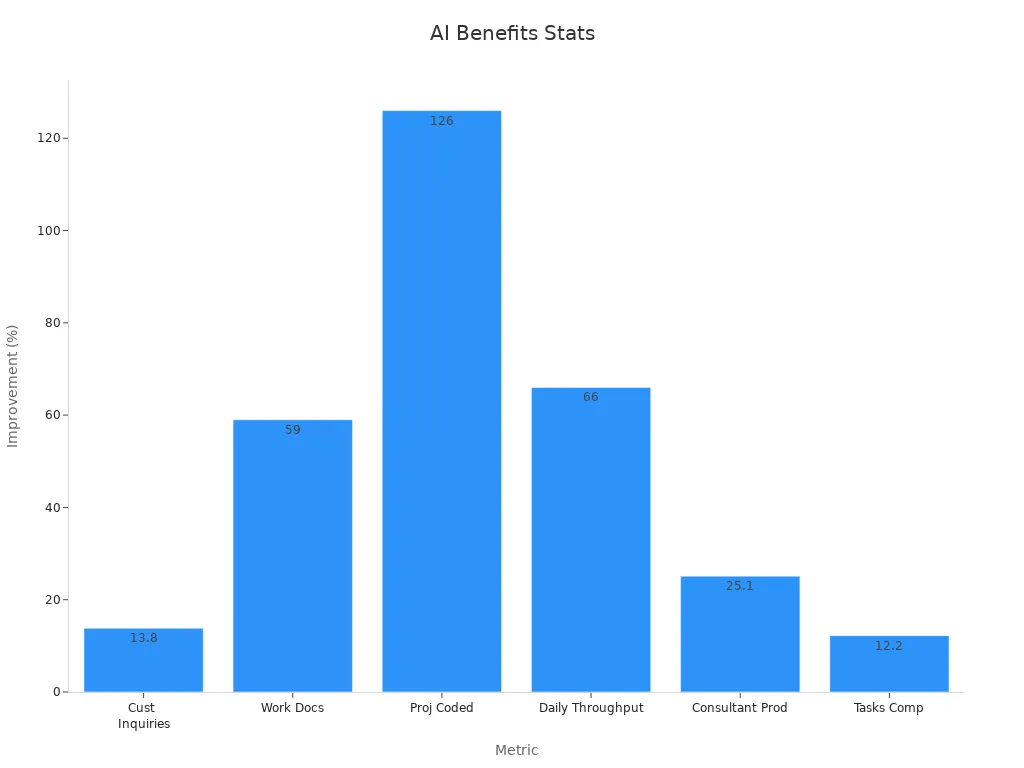Top Gemini AI Agent Builder Alternatives for 2025

The growth of AI in 2025 is set to transform businesses in significant ways, with the industry projected to expand by $50 billion that year. Choosing the right tools will be crucial for success. Many companies are exploring alternatives to the Gemini AI Agent Builder, and one standout option is NewOaks AI. Known for its robust features, NewOaks AI enhances customer service and streamlines workflows, making it an excellent choice for businesses.
AI agent builders offer substantial advantages, tackling tasks such as coding, marketing, and customer interactions. These tools save both time and money. For instance, 25% of companies utilizing AI are planning to test agentic AI in 2025, and this figure could potentially double by 2027. This underscores the importance of adopting a reliable platform like NewOaks AI to ensure your business stays ahead in the evolving AI landscape.
Key Takeaways
AI agent builders are important for businesses in 2025. They save time and money by automating tasks and helping customers better.
NewOaks AI is a cheaper and flexible choice than Gemini AI. It offers custom options and works well with current systems.
No-code AI tools let people without tech skills make AI fast. This makes automation easy for businesses of all sizes.
Open-source AI tools give more control and can be customized. These are great for tech teams who want specific solutions.
Picking the best AI agent builder means checking features, cost, and if it fits your business goals for future success.
Why AI Agent Builders Matter in 2025
How AI is Changing Business Automation
AI is changing how businesses work in 2025. Companies use AI agent builders to save time and improve work. These tools help with tasks, making them faster and easier. Multi-agent systems let AI agents work together to finish hard jobs. Memory-enabled agents remember past chats, giving customers a personal touch. Domain-specific agents are also popular, offering special solutions for areas like real estate, HR, and online shopping.
The results are clear. Businesses using AI save up to 30% in costs in one year. Automating tasks like invoice handling cuts time by 70%, saving $500,000 yearly. These changes show why AI agent builders are now a must-have for staying ahead.
Trend | What It Does |
|---|---|
Multi-agent systems | AI agents that work together to finish hard tasks. |
Memory-enabled agents | Agents that remember past chats to make things personal. |
Domain-specific agents | Focused on areas like real estate, HR, and online shopping for special solutions. |
Why Use AI Agent Builders
AI agent builders bring big benefits to businesses. They make building chatbots and helpers quick and easy. These tools also improve customer service by answering questions faster. For example, AI-powered agents can handle 13.8% more customer questions each hour, making work smoother.
AI tools also help workers save time. Employees save 1.75 hours daily by automating boring tasks. This extra time can be used for important work like finding new customers. Programmers using AI tools finish 126% more projects weekly, showing how AI speeds up new ideas.

Problems with Gemini AI Agent Builder
Gemini AI Agent Builder is popular but has problems. One issue is it doesn’t grow well with big companies. Many businesses find it hard to connect Gemini with their current systems. This makes AI work harder to manage. Also, Gemini doesn’t offer many ways to customize, which limits its use for specific industries.
Another problem is its cost. Many users think it’s too expensive compared to other tools. This makes it hard for smaller businesses to use Gemini for customer help or finding leads. Trying other options like NewOaks AI can solve these problems and help businesses get the most out of AI.
Top Gemini AI Agent Builder Alternatives

NewOaks AI: A Great Gemini AI Agent Builder Option
Looking for a better option than Gemini AI Agent Builder? NewOaks AI is a top pick. It’s easy to use and works for all business sizes. With NewOaks AI, you can make smart agents to answer questions, automate tasks, and find new customers. It grows with your business, so you won’t outgrow it.
NewOaks AI connects well with systems you already use. You won’t have the connection problems that other tools might cause. You can also customize it to fit your industry, like retail, healthcare, or banking.
Another big plus is its price. Gemini can be pricey, but NewOaks AI has flexible plans. These plans are great for small and medium businesses. Choosing NewOaks AI gives you a strong, affordable tool to stay ahead in AI.
Open-Source AI Agent Builders
Open-source AI agent builders are great for control and flexibility. These tools let you change AI agents to fit your needs. AutoGen is a popular choice. It supports teamwork between agents and tool use, making it very useful. Businesses can try it instead of using expensive tools.
Apps like AutoGen Studio and Composio show how flexible open-source tools are. They help create special apps with different levels of independence. For example, Dream Team and GraphRAG are built on AutoGen. These apps work well in controlled settings while keeping some human control.
Open-source tools also encourage new ideas. Developers from around the world improve them and add features. If you know tech or have a team, open-source AI tools can save money and be very powerful.
Enterprise-Grade AI Agent Platforms
Big companies need strong AI platforms for tough jobs. Enterprise-grade platforms handle lots of data and hard tasks. They have advanced tools like language understanding and data predictions. They also work with big systems like ERP.
These platforms can grow with your company. They support many AI agents at once, perfect for global businesses. They also focus on safety, keeping important data secure.
Some platforms are made for specific industries. For example, they can improve supply chains in factories or help customers in stores. If your business needs high performance and custom options, these platforms are a smart choice.
No-Code AI Agent Builders
No-code AI agent builders are changing how businesses use automation. These tools let you make smart agents without knowing coding. With easy drag-and-drop features, you can design AI tools for your needs. This makes no-code platforms great for teams wanting fast solutions.
Why No-Code AI is Popular
In 2025, no-code AI tools are important for all businesses. They let you create and adjust AI agents without writing code. This helps you focus on fixing problems instead of learning tech skills. For example, no-code AI chatbots can answer questions, set appointments, or suggest products.
Why no-code AI works well:
It’s faster. Build AI agents in days, not months.
It’s cheaper. No need to hire costly developers.
It’s simple. Non-tech teams can help with AI projects.
Growth and Features of No-Code AI Tools
More businesses are using no-code AI tools. Over half of big companies now use AI agents. Smaller businesses are joining in, with one-third already using them. No-code tools are 33% better at reaching full independence than older methods. This shows how they’re changing the AI world.
Feature/Metric | Value |
|---|---|
Businesses using AI agents | Over half of large companies |
Small businesses using AI agents | About one-third |
Higher autonomy with no-code AI | 33% more likely |
Benefits of No-Code AI Chatbot Platforms
No-code AI chatbots are improving customer service. They help you make bots that reply to customers quickly. These bots can handle many chats at once, saving time. For example, a no-code chatbot can answer common questions, manage returns, or guide users online.
How no-code AI chatbots help:
They make customers happy with fast replies.
They let your team focus on harder tasks.
They fit your business, whether in retail, health, or banking.
Tip: Start small with no-code AI tools. Create a simple bot to fix one issue. Once it works, add more features.
Why Choose No-Code AI
No-code AI tools aren’t just trendy—they’re useful for staying ahead. These platforms make AI easy for everyone to use. Teams can solve problems as they come up, staying flexible. Whether you run a startup or a big company, no-code AI helps you grow without spending too much.
Comparing AI Agent Builder Alternatives
Features and Capabilities of Leading Platforms
Picking the right AI agent builder depends on your business needs. Top platforms have tools to make building agents easier. They also help improve how you connect with customers. For example, NewOaks AI works well with systems you already use. It also lets you customize for industries like retail, healthcare, or banking. This makes it great for handling specific tasks.
Open-source platforms, like AutoGen, let you change and improve AI agents. These tools allow developers to add special features. If your team knows tech, open-source options can save money and fit your needs.
Enterprise-grade platforms are built for big companies. They handle many agents at once and work fast. These platforms include tools like data predictions and language understanding. They are perfect for hard jobs like financial planning or managing supply chains.
No-code platforms are easy for non-tech users. You can create chatbots and agents using drag-and-drop tools. These are great for small businesses needing quick solutions. As your business grows, you can update your AI agents easily.
Pricing Models and Affordability
Knowing pricing is key when picking an AI agent builder. Different platforms have plans for all business sizes. Here’s a simple look at common pricing models:
Pricing Model | Cost Range | Benefits |
|---|---|---|
Usage-based | $0.001 - $0.01 per call | Saves 40% for seasonal businesses; low costs for small teams. |
Flat-rate | $200 - $2000/month | Easy budgeting; saves 25-35% for high-use companies with yearly plans. |
Consumption tracking | N/A | Cuts costs by 20-30% in the first year with better usage choices. |
Tiered pricing | $50 - $200/month (Starter) | Easy upgrades for growing businesses; fits different needs. |
Pay-per-use | $0.01 - $0.05 per call | Saves 20-40% after 50,000+ monthly interactions. |
Usage-based plans are good for businesses with changing needs. You only pay for what you use, saving money during slow times. Flat-rate plans are best for steady interaction levels. They make budgeting simple.
Tiered pricing is flexible for growing companies. Start small and upgrade as needed. Pay-per-use plans are great for high interaction volumes. They get cheaper as you use more, saving money over time.
Best Use Cases for Each Alternative
AI agent builders are useful in many ways. Here are some top examples:
Automated customer support systems: AI agents answer questions, handle returns, and guide users. This helps customers and reduces your team’s work.
Predictive maintenance in manufacturing: AI predicts equipment problems, saving money on repairs.
Advanced financial modeling: AI analyzes data for accurate financial insights and forecasts.
Intelligent chatbots for customer engagement: Chatbots suggest products, set appointments, and answer questions, improving customer experience.
Automated marketing campaign optimization: AI checks campaign results and suggests ways to improve them.
Simplified inventory management: AI tracks stock and predicts demand, so you always have what you need.
Retail store optimization: AI manages product placement and stock. For example, Zara uses AI to predict demand and improve its supply chain.
Each platform has strengths for different tasks. Open-source tools are great for custom needs. Enterprise-grade platforms handle tough jobs, while no-code tools are perfect for quick and easy solutions.
Tip: First, figure out your business needs. Then, choose a platform with the best features and pricing for your goals.
Essential Features of an AI Agent Builder
Scalability and Flexibility
Scalability helps AI tools handle more work as businesses grow. A good platform adjusts to your needs over time. Modular designs let parts work separately, making upgrades simple. Loose connections between parts make changes easier. Stateless systems use resources better, handling tasks quickly and smoothly.
Flexibility means AI agents can fit different tasks. You can adjust settings to match your needs, like answering customer questions or automating jobs. For example, AI agents can handle tricky tasks by using tools on their own. They also improve over time, offering better solutions as your business changes.
Integration with Business Systems
Good AI tools connect easily with your current systems. This makes work faster and smoother. Studies show AI agents cut customer response times by 80%. They also handle many languages and give quick access to important files. These features save time and improve customer service.
For example, Klarna used AI agents to handle most customer requests. This reduced the need for 700 human workers and added $40 million in revenue. Banks also use AI for reports, making data collection easier. These examples show how AI tools can improve work in many industries.
Security and Compliance Standards
Security is key when using AI tools. Platforms must protect data with encryption to keep it safe. Features like OAuth and IP controls stop unauthorized access, keeping your business secure.
Following rules like GDPR or HIPAA is also important. This ensures customer data stays private and avoids legal trouble. Choosing a secure platform lets you focus on helping customers without worrying about risks.
Deployment Strategies for AI Agents
Cloud-Based vs. On-Premises Deployment Options
When setting up AI agents, you can choose cloud-based or on-premises systems. Each choice has its own benefits based on your needs. Cloud-based systems are flexible and easy to scale. You can quickly add resources for more users or tasks. This option is great for businesses wanting fast setup and lower starting costs. But, it depends on vendor data rules, which might cause security worries.
On-premises systems give you full control over your data. They offer top security since your data stays on your own equipment. This is perfect for industries like healthcare or finance, where privacy is very important. On-premises setups also let you customize more to fit your needs. However, they cost more upfront and need regular maintenance.
Factor | On-Premises | Cloud |
|---|---|---|
Security | Best; data stays on-site | Depends on vendor rules |
Availability | Faster; uptime depends | Vendor SLAs; may be slower |
Customization | Fully adjustable | Limited by vendor design |
Costs | High upfront, lower later | Low upfront, higher over time |
Tips for Seamless AI Agent Integration
Adding AI agents to your systems needs good planning. First, check your data quality and system compatibility. Bad data can make AI agents less effective. Make sure your systems share real-time data to improve results. For example, a healthcare company boosted customer satisfaction by 35% after training agents and matching them with current workflows.
Start with simple tasks that have big benefits. This helps you test the system and find problems early. Managing changes is important for success. Talk to your team and customers about the new AI tools. Offer training so everyone knows how to use them well. Keep checking the system to avoid slowdowns and ensure it works smoothly.
Tip: Begin with small steps and grow slowly. This lowers risks and makes the switch easier.
Security Considerations for AI Agent Builders
Keeping Data Safe
Protecting sensitive data is very important when using AI tools. These systems often handle personal and financial details from customers. If not secured, this data can be stolen or misused. For example, AI tools without encryption can make private information easier to hack. Saving user data without clear rules can also lead to leaks.
AI can help by sorting data, watching who accesses it, and warning about risks. But you should add extra safety steps like encryption and access controls. These measures stop unauthorized access and follow data protection laws. Research shows that developers using AI sometimes create less secure programs. This means you need to be careful when adding AI to your systems.
Risk Type | What Happens |
|---|---|
AI creates fake content that looks real, making fraud harder to spot. | |
Weak AI Code | AI-assisted coding can lead to unsafe programs, increasing risks. |
Integration Problems | Mixing AI with current tools can improve systems but may also help hackers. |
Fixing these problems keeps customer data safe and builds trust in your AI systems.
Following the Rules
Following laws is key when using AI tools. Rules like GDPR and CCPA require businesses to protect customer data. Breaking these laws can lead to big fines and hurt your reputation. AI tools can help by checking for rule violations and keeping data private.
For instance, AI can hide personal info in files or alert you about new laws. These tools make it easier to follow the rules. AI can also review contracts and legal papers to ensure they meet the required standards.
Agent Name | What It Does |
|---|---|
Tells teams about new rules to stay compliant. | |
HIPAA Check Agent | Checks records for HIPAA rules and flags issues. |
Privacy Monitoring Agent | Removes personal info from files to keep data safe. |
Legal Document Review Agent | Examines contracts to ensure they follow laws and company policies. |
Using these tools helps your AI systems follow the law and avoid problems. Always focus on compliance to protect your customers and your business.
Picking the right AI agent builder is key for success in 2025. NewOaks AI is a flexible and budget-friendly choice. It works well with industries like retail, healthcare, and banking. Other options include open-source tools, enterprise platforms, and no-code solutions. These fit both small businesses and big companies.
Look at features, costs, and uses when choosing a platform. For example, Kompas AI gives detailed reports at a good price. It’s great for professionals who need accurate information. Experts say AI agents will grow fast. By 2026, 82% of companies plan to use them for tasks like emails and customer service.
Keep up with new AI developments. The field changes quickly with better algorithms and stronger computers. Staying informed helps you use AI to improve customer service, speed up work, and grow your business.
FAQ
What is an AI agent builder?
An AI agent builder is a tool to make smart helpers. These helpers can do tasks, answer questions, and make work easier. They save time and help businesses work better in many fields.
How do no-code AI platforms work?
No-code AI platforms let you build helpers without coding skills. You use simple drag-and-drop tools to set up tasks and features. This makes it fast and easy for anyone to create and use AI tools.
Are open-source AI tools secure?
Open-source AI tools can be safe if used correctly. Keep them updated, use encryption, and control who can access them. Always check the tool’s updates to make sure it stays secure.
Can AI agent builders integrate with existing systems?
Yes, most AI agent builders work with tools you already use. They connect to things like CRMs, ERPs, and databases. This helps your business run smoothly and keeps data organized.
Why is scalability important in AI tools?
Scalability means AI tools can grow with your business. As your business gets bigger, scalable tools handle more work and users. This makes them a good choice for businesses of any size.
See Also
Which AI Chatbot Will Dominate: ChatGPT Or Watson in 2024?
Harnessing The Power Of Advanced AI: GPT-4 Turbo Insights
Discovering AI Options And HoneyBook Alternatives For Small Enterprises
Integrating AI Into Social Media: Tailored ChatGPT For Snapchat

